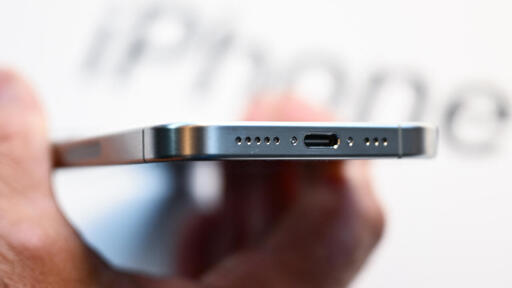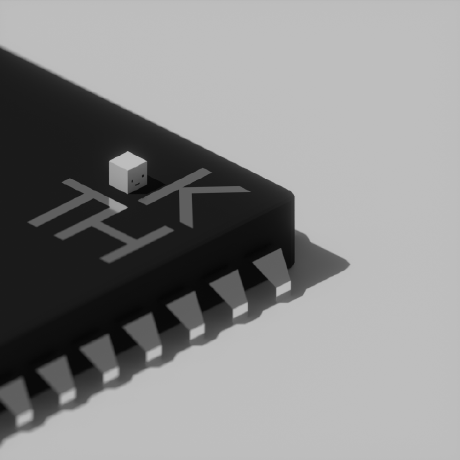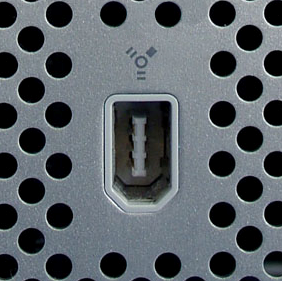Suck it micro USB, mini USB, and lightning! 🪫🔋
My only concern with this law, is that what happens when USBC is no longer the best option. Idk how to express what I’m saying but what if USB-G ends up being 1000x as fast. Does this law allow for chargers to evolve and if so, how? I admit I haven’t looked into this but I’ve been wondering about it.
I’m 99% wireless these days so I wouldn’t be surprised if chorded chargers are largely on their way out, but I’m still curious.
Manufacturers are allowed to add supplementary charging standards on top of USB-C PD, and the commission is required to review the landscape every 5 years to see if a new technology is better than USB-C that should be adopted in the future
Awesome! I knew by commenting someone educated would come along. Thank you very much.
It’s like when I make it rain or snow by washing my vehicle! I’m giving you part of the credit for it being future-focused…
⛈️
And they’re using recommendations from the USB consortium, which is comprised of all the large manufacturers in the world, so it should always be up to date during the review process.
Manufacturers are allowed to add supplementary charging standards on top of USB-C PD
Controversial opinion: I wish this wasn’t the case. So many different proprietary protocols, most of the time you’ll still need a specific adapter, and in some cases even a proprietary cable to utilize the full speed, and nowadays most devices come without the adapter.
And there’s even PPS in the PD spec allowing to request for a specific voltage rather than something in an existing list.But I do also have some personal grievances here:
-
Mi TurboCharge - This may be something based on PD, but still being something separate. I don’t know, but I do know it requires more pins than USB-A has. 5 pins. Somewhere I read this is connected to a CC pin in the USB-C connector. But no, they did not use USB-C, they used USB-A, with an extra pin. Only shortly before the phone died I finally figured out why it wasn’t charging as fast as expected - I wasn’t using their proprietary cable.
-
My current phone’s interference (?) with Qualcomm QC 2.0 - Somehow when using a cable with non-perfect connection on QC-compatible adapters, when I move the USB-A connector, it starts triggering 12V mode until it finally shows overvoltage error and slows down to 7W. QC 2.0 is how my USB tester identifies it. This is a MediaTek-based device, so I don’t think it would support QC. The original adapter uses PD and some 11V 6A thing with unknown protocol. Perhaps that is where the problem originates, I don’t know what data it sends down. But testing with OTG adapter on the original brick it seems the protocol needs the extra pins of USB-C to work properly.
I’ve had 3 phones that supported some fast charging, so far 2 of them made it into a confusing mess. Had they all used just PD it would have been a better experience.
I agree, but at least requiring USB PD, as it’s written, will at least give you 240 watt USB-C charging if they offer higher than 240 watt charging through a proprietary standard
If you have a cable that supports it, which is not usually obvious. And if you have a charger that supports it, which tends to be easier, but again, not always obvious. And don’t even start on transfer speeds or whether or not it’ll support lower usb standards like keyboards and mice. (I have a fairly high end cable that supports the highest speed data transfers but a keyboard will not work on it)
Micro was the worst connector I’ve used, and I’m happy for its demise, but at least I knew what I was getting when I plugged it in.
Transfer speed isn’t part of this regulation, but yeah, making it clearer on the box the max power output on chargers and cables would be a good continuation of the requirements
at least I knew what I was getting when I plugged it in
Mostly. There was some nonsense about fast charging if the data lines were shorted together that made things weird from time to time.
From Annex Ia of directive:
3.2. ensure that any additional charging protocol allows for the full functionality of the USB Power Delivery referred to in point 3.1, irrespective of the charging device used.
-
USB-C doesn’t have speeds, it’s just a connector type. USB 1, 2, 3-3.2, 4 etc. is the protocol responsible for speed. You can have a USB-C connector with any implementation (except maybe USB 1). It can even do DisplayPort stuff.
So for USB-C to become irrelevant we need to come up with a better connector form factor. Which is unlikely to happen soon. But also, same thing happened with USB-B Micro connector (colloquially called micro USB), it was designated as a standard (but Apple managed to get an exemption) and manufacturers had no issues moving to a better connector, which is USB-C.On the downside, you can’t tell what the port supports by just looking at it.
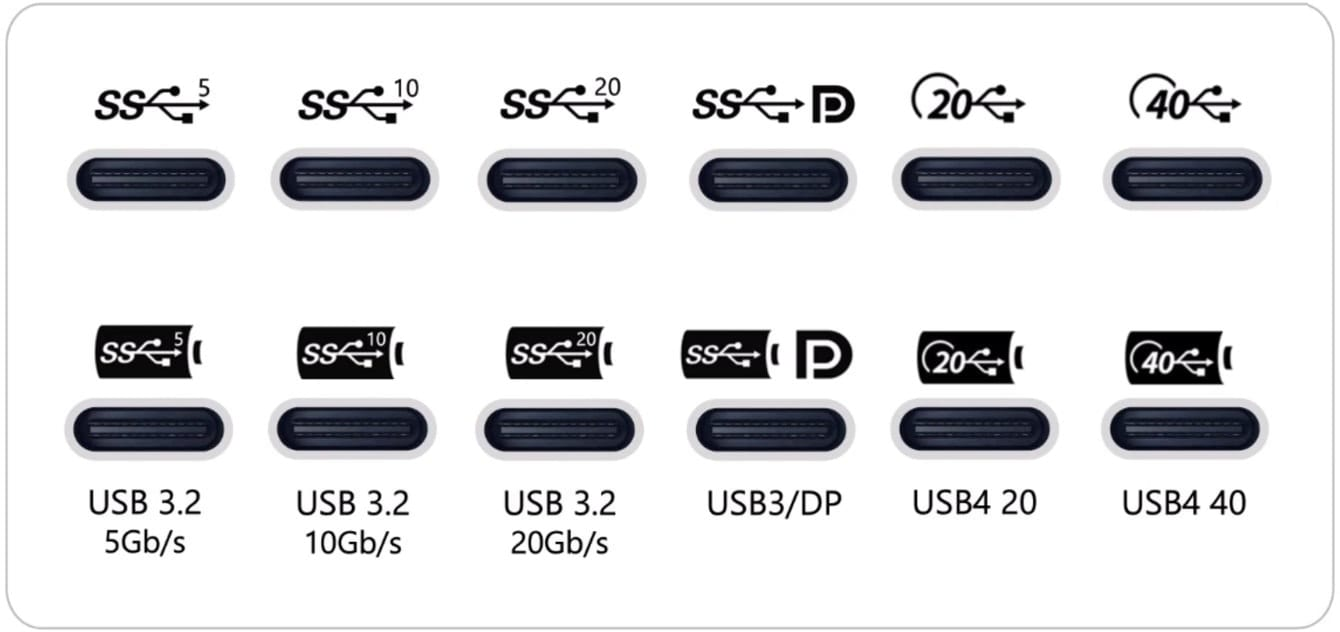
Even with this graphic, I still don’t know what they support. Is circle-20 also 20gbps? What is the speed when there’s no number? Do the non-DP ones not support displays at all? And there appears to be no such thing as USB4-DP?
And good luck getting your grandmother to identify any of this over the phone. “Is it marked SS-subway diagram-20, or circle-20-subwaydiagram? Yes it’s etched gray on slightly different gray, go put on your strongest glasses first, grandma.”
Also, who’s at reading distance from a USB port half the time? Sometimes they’re on the front of a device, but they’re just as often hidden behind something or in a hard-to-reach place. Monitors and PCs come to mind.
It’s not like they’re going to change when you’re not looking.
USB4 supports DP and TB3.
My phone doesn’t have any kind of marking anywhere on it so I’m guessing it’s USB DP
Googling for it, my phone (pixel 9 pro fold) has USB 3.2, so it shouldn’t be able to drive a DP display
Was wondering about thunderbolt. Found this, which I interpret as
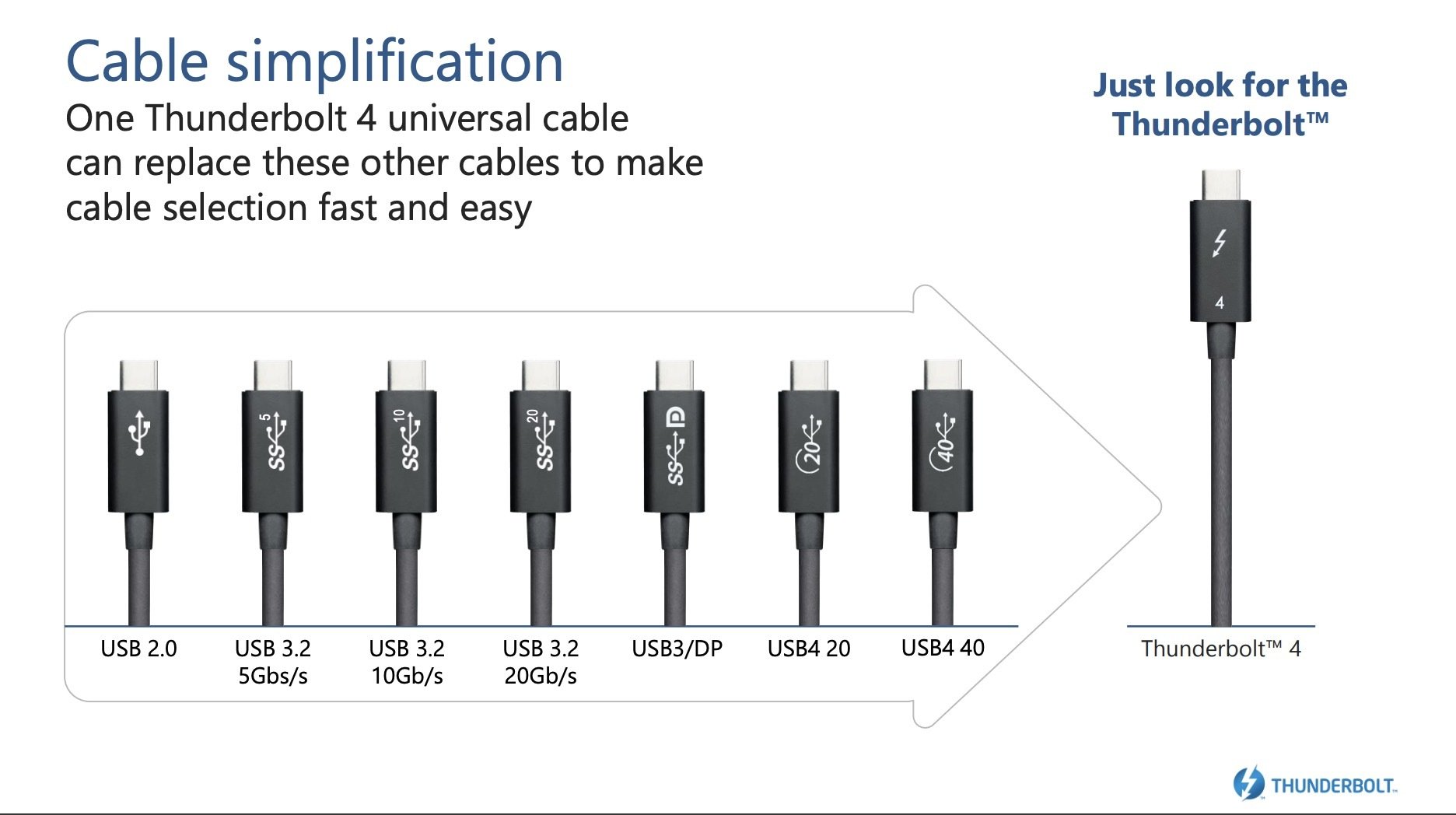
usb 4 40 = thunderbolt 4
Wow what a marketing
scumtrick to show all compatible older generations as separate products
I liked the magnetic apple connectors.
I hate Apple though.
You can have both, like MacBooks do
The original MagSafe is great. I still have it on my laptop.
Very much in favor of the mag induction charging! That should be a standard for wall plugs as well
MagSafe/Qi2 is definitely convenient, but you have to be wary of its downsides. 2 of which are:
- wireless induction wastes a good amount of energy being transferred
- wireless induction additionally heats up the battery and reduces its lifespan
But the good news is, it’s basically the defacto standard. Since Apple opened up this standard it pretty much killed all the competition. The adoption is expected to increase in the coming years.
I wouldn’t have even known what to google to learn this. Thanks for sharing! I actually love the C form factor I didn’t realize that was kinda what made it C and not what it could do. I appreciate your response.
Wikipedia is a good resource
What I don’t understand is what was wrong with mini-USB.
Too thick? Just why do people want a portable computer to be thinner that their wallet, or their notebook, or their damned pen, or that Snickers bar in their pocket which nobody made thinner. Who the hell told them that “miniaturization being the future of tech” has anything to do with the box inside which that tech is mounted being just a bit thinner? I mean, were it thin enough to put computers into printed magazine pages, maybe (I think I’ve read that someone did this, with a computer kinda as powerful as ZX Spectrum). Why do they specifically need it? Not to appear “modern”, but really?
The question is, because for me personally mini-USB was very convenient. It held well, was easy enough to stick the right way (and not ruin it trying to stick it the wrong way).
Now, I guess USB-C is fine if it can do the same and go both ways. I actually like it, except RPi 4 is the only device I have needing it.
It’s just … how can one try so many connector types for one group of standards?..
If I were to guess, it would be the additional pins. USB-C PD is capable of decent power transfer while also having enough data transfer capability simultaneously. USB-C docks are a good example, seeing that you can hook up a display, charger, other USB devices, ethernet, etc and have it all go through a single cable and (compact, convenient) connector. The reversibility is an added bonus
Mini-USB sucked, big time. Not so bad as micro, but yea it was bad.
The main advantage of C over all previous versions is that it’s reversible, you can’t plug it in wrong. The shape is also… “flat”?, so it’s easier to fit into the socket, mini had that wavy like thing going on.
My data source is my small kid: he’s broken 3 (and counting…) usb-
minimicro connectors by tugging the charging PS4 controllers, and he has to ask me to connect the cable to charge them, he’s unable to do it himself yet. With his tablet, 0 usb-c connectors broken and he can plug it in himself.I think you guys are taking about micro USB. PS4 controllers have micro, PS3 controllers had mini USB.
They were both equally terrible the only improvement micro had over mini was it was slightly smaller.
I stand corrected, thanks. The mini was bad, the micro in the PS4 controllers is god awful.
That is correct.
Sigh. OK. About breaking stuff - my mom managed to break an RPi charger of all things.
USB micro (not sure if you’re getting micro confused with mini, but doesn’t really matter) only supported data transfer, not video transfer (like HDMI). Some USB-C ports are data only, but it theoretically supports more than USB micro was ever capable of.
For example you can buy a USB-C to HDMI cable for a few dollars, which could theoretically plug your phone directly into your TV (if your phone supports that). But a USB micro to HDMI cable was called an “MHL adapter” and was expensive and only worked on specific MHL capable phones like this one. It has a separate box that requires its own power cord in order to work, it’s not just a simple cable. USB-C should, in theory, eliminate the need for such a thing.
I do have that adapter, but you immediately realize phone screens suck when you mirror them on a big TV. Unfortunately it didn’t want to use it as a secondary screen - I don’t know if that has changed with modern iPhones/iPads: I should dig that up and try again
At the risk of sounding like Blizzard, don’t you have a phone? Even my previous phone, Galaxy S8 had USB-C. Or do you have an old iPhone?
Pretty much all electronics that came out in the past 4 years use USB-C. Just an example, here’s a non-exhaustive list of things that I charge with C:
- MacBook (2020)
- iPad (2018)
- Galaxy S10e (2019)
- Steam Deck (2022)
- Nintendo Switch (2017)
- Kindle (2020)
All of these are, on average, at least 4 years old. So I’m pretty sure the average consumer has already switched to primarily USB-C
When I think about it, my phone is like 2 years old. Micro-USB.
What phone is that? Genuinely curious. Was it actually manufactured in 2022 with micro USB?
2020, my bad. Checked. In any case it’s BQ-5046L, sort of what you buy when you don’t like the whole idea of Android, but need some stuff for work.
Even for a 2020 release, it must be an outlier. Actually never heard of BQ Mobile until now. Apparently, they released their last phone in 2020, and in 2021 completely ceased operations. They were probably trying to use up all the remaining micro USB port modules to cut costs or something.
The plug will be the same, bet money. There are already several sorts of USB-C. And think on this, the USB-A has had the same shape for going on 30-years.
This, USB-C is just the connector shape. USB-A is the standard square plug everyone knows, USB-B has several different ends, some more well known than others. The full sized “printer/hub” one, mini-B and micro-B which more people know. USB-A to A cables aren’t common, more akin to an Ethernet crossover cable, so you’re almost always going to see one of the B connectors.
USB-C is just the newest plug design, the actual cable and communication protocols have changed numerous times over the decades. USB-C might have been introduced alongside USB 3.0 and the massive increase in charging and data speeds with the new standard, but they are not exclusive.
The most obvious example is probably the iPhone 15 and 16, both had a USB-C plug, but the devices only supported USB 2.0 protocols.
USB-A to A cables aren’t common
I believe USB A-to-A cables actually violate the USB spec and should not in fact ever exist. They definitely should not exist as a straight-through cable (although obviously they still do in reality) without any active electronics in the middle. Male A plugs are solely for connecting to a host device, and the entire purpose of the spectrum of B plugs in their various guises is specifically to make the other end of the cable that goes into the endpoint device different. The point is that you are not supposed to be able to directly connect two hosts together like that.
A straight through dumb A-to-A cable would connect the +5v pin from the host device directly to the +5v pin on the device on the other end of the cable. If you did this between two host devices (i.e. two computers) it is certainly possible that Bad Things would happen if the designers of both devices did not account for this type of stupidity. The only way one of these can be valid according to the spec is to omit the power pins entirely.
That said, I have a particular flashlight that came with exactly one of these naughty cables: A straight through male USB A-to-A cable with no smarts in it whatsoever. The flashlight charges via a USB-A port which is exceptionally bizarre, and I suspect the reason it does so is because it can also act as a power bank and the manufacturer was too cheap to include a type C or micro B or whatever port for input and a separate type A port for output. But now I’m stuck having to use the moronic cable it came with (which is also only like 14" long) without much hope of ever finding an alternative or replacement…
Invalid USB-A male to USB-A male cables are also commonly used on low cost KVM switches.
The one I got from Amazon has two of them - one for each computer, then the other end of each cable connects to the switch. The switch has its own micro-USB power supply but it is optional, so the cables must pass power
Extra crispy. I wonder if a replacement cable for one of those will work with my flashlight. It probably will.
Speaking of illegal weird cables: I actually have a Y shaped cable, USB Type-A male to USB Type-A female with an extra red USB Type-A male to inject more power if the host can’t power the device otherwise.
I’ve used it once to attach an external HDD to an Android Phone with an OTG male micro-B to female A adapter. It worked but it was kind of stupid :-D
Those used to be common for stuff like external drives (HDD, DVD…)that needed more power than old USB ports could provide, so they used two
Male to female A-to-A cables are pretty common (they’re just basic extensions) and totally legal under the spec provided they’re limited to a certain length or contain a powered repeater. It’s just the rare male-to-male (which my keyboard stupidly uses) and even rarer female-to-female that aren’t legal. There’s also the exception of USB-on-the-go cables with a micro-B end and a female A end for devices like smartphones that are capable of being host or connecting to a host, back before they switched to USB-C.
Yeah I remember back before CD-R was widespread, having only 3.5" floppies a Zip 100 drive, trying to look into how to move files from our old family computer to a new one.
I did find some sort of software at Best Buy or Circuit City, someplace like that, which used an A-A cable to directly connect two systems.
Yep. These were a stopgap in the days when normal users could not be expected to have a functional home network of any sort. Those were indeed active devices, and had a lump in the middle of the cable that basically amounted to an integrated USB hub.
Why not a serial null modem cable and zmodem?
USB-B has several different ends, some more well known than others.
micro-B SuperSpeed is always a good one to surprise people with.

I have a portable hard drive that uses this. I haven’t bought a new cable yet, limiting me to USB 2 speeds. Bleh.
Using those now! Have 3 drives in a Storage Space, another for backup. (And offsite backups!)
I had not thought of this good point.
There’s only so much power you can put through such a small connector. I could certainly see a high end gaming laptop requiring more than 240W since GPUs keep getting more power hungry. They could increase the voltage a bit, but I doubt they will go much higher.
There’s already docking stations for laptops that use two USB C connectors for exactly this reason.
That’s so janky lol
Fair point but even though it seems USB-C caps out at 5A, it’s quite possible the voltage could be even higher when higher quality materials are used for the existing connector along with controllers that, say, check the resistance before asking for said higher voltage, thus delivering higher wattage. Also keep in mind that the general trend is efficiency, especially with ARM gaining serious momentum.
If you bothered to read the article, you’d notice that the charger was chosen by the manufacturers a decade ago in a summons by the European commission. If Apple had complied to do what they agreed to do back then, this law wouldn’t exist. But they got whiny and litigious. So, instead of an at will standardization program, the EU decided to make it mandatory by law, to shut Apple up, and anyone else who wanted to forcibly refuse to comply. The cool thing about European law is that nothing is written in stone. Not even constitutions are considered sacred, unlike in the Americas, and can be changed at any point or amended as long as proper procedures are followed. There’s nothing, ever, preventing the EU from calling another commission of tech companies to choose a new charger, if a better one ever shows up.
I did read the article but didn’t know anything about EU law. Someone else shared an excerpt of the law and kindly explained how it worked. Thanks for your response though.
You should verify this, but I think there is like a consortium of sorts made up of tech companies that pick a standard that they all must follow. So in the future, it’s possible for them to pick a new standard, and then after a transition period everything would be required to switch (though of course you could still continue using old devices, they just can no longer be sold new).
What happens if the better technology is invented by a company not part of that chosen tech club? They get to block it’s adoption?
If it’s really that much better, it’ll be used for other things and catch on, then they’ll be a part of the group.
How can it be used for other things, if this law makes that illegal?
The new law allows you to have more than one charging connector provided that either the USB-C one is the best one, or the USB-C one is as good as the spec allows. If the new connector’s genuinely better, then it’ll beat a maxed-out USB-C connector, so devices will provide it in addition to a maxed-out USB-C connector.
uh huh and when the company is sued into oblivion proving their tech is better then what? the problem with laws like this (and I generally support it) is that they give bad actors ways to club others to stifle competition.
What would they be sued with?
There is no requirement to prove that a different connector is better. They simply have to provide it and then it can be better by obvious design. Although it’s irrelevant anyway because no company is going to come up with a better adapter than the USB consortium. Practically every manufacturer is already in it.
Sued for following the law and making sure the required connector is present and functional? Unless I’m missing something, the law doesn’t require the port be exclusive. I mean, if it did, they’d have to stop including wireless charging, and I don’t see that happening.
It doesn’t. It only applies to “smartphones, tablets and cameras”, according to the article.
Starting today, all new mobile phones, tablets, digital cameras, headphones, speakers, keyboards and many other electronics sold in the EU will have to be equipped with a USB Type-C charging port,"
Source: the article
Well now I don’t know what to believe. Anyone have a link to the legislation?
[…] have to be equipped with […]
That does not mean only equipped with
Fair. I only use cables, but my assumption would be that they would adapt to new standards. Which is effectively what this is doing to standardize it, IMO.
Law does not forbid having multiple charging ports.
USB-C standardizes only a connector. Thats good since there’s a lot of room to evolve the standard while keeping at least physical compatibility, but also bad because now we’re back to a stiuation where we have things that fit together but maulnot be entirely compatible. I suppose there’s a minimum base and a negotiation process so things should somewhat work plus tend to improve over time.
I’m 99% wireless these days so I wouldn’t be surprised if chorded chargers are largely on their way out, but I’m still curious.
How fast is the wireless charging these days? I’d be surprised if it’s anywhere near the higher USB PD 3.1 modes.
I’m not sure. I know I could get a high speed one but tossing my phone on at night and currently it lasts all day most days. Same with my watch.
I don’t think that will occur, because what’s the point of developing USB-G if you’re not allowed to use it in a product?
Why wouldn’t they be allowed to use it?
Computers have room for multiple ports and is where a new standard would crop up anyway even without the law, just like where USB-C started out.
USB-C isn’t the best option at all because USB c isn’t USB c. It only standardises the port and connector but there are many different connectors.
https://hackaday.com/2022/12/06/usb-c-introduction-for-hackers/
This is an interesting article, but I think that this standardisation is exactly for port being the same, not for pinning specific implementation of the 600+ pages long standard.
Thanks for the article, cool read!
It’s crazy, isn’t it? But it’s not a single article… I think there are ten more.
deleted by creator
If you don’t know the answer it is of course perfectly acceptable to just not provide one.
Now for those swappable batteries
Including cars.
Drive in, swap non-proprietary batteries with an autoloader, drive out. Done.
Yes and no. No need to hot swap massive EV batteries. Rapid is fast enough. But yes so the EV can be upgraded. The batteries go obsolete quicker than they degrade. So make it so we can swap the batteries and keep the rest running. In fact, just right-to-repair the whole car. In fact, the whole everything!
Hot Swapping batteries is actually surprisingly good for the life of the battery if done well.
Rapid charging the battery does do permenant damage over time especially if you fast charge every time. Whereas if you can hot swap a battery and have a suitable stockpile of them you can trickle charge the battery over a couple of hours instead of 30 mins and prolong the overall lifespan of the battery. Even slowing down the charge rate to 1 hour reduces wear on the battery significantly. Plus, without time pressure from a customer, more time could be taken to replace damaged cells or blocks in a battery so that one pack will more effectively use the whole battery up instead of throwing away perfectly good cells.
See, for me, I rapid charge like once a month. All the rest of the time I use my home charger or even a granny lead. 10A granny charging is absolutely fine overnight. But for the size of the E-Berlingo, the battery is a bit small and I know all kind of new batteries are coming. More kWh for the same weight/size, less degradation, safer, etc etc. If I knew the car was designed with battery replacement in mind, I’d worry a lot less about it being obsoleted prematurely. These cars are all black boxed stuck together. It’s not built with repairing and upgrading in mind.
@jabjoe
At least ‘some’ minimal standardisation so we can exercise the #righttorepair
@DrownedRats @technologyExactly. I want things, especially expensive things, built to be repaired and upgraded. Not vendor locked and with built in obsolescence.
In fact, just right-to-repair the whole car. In fact, the whole everything!
Boy, that escalated quickly
But yes, please.
The batteries don’t live in isolation. There are other pieces that are dependent, whether for basic function or for calibration.
Example: Chevy issued a recall for mislabeling some Bolts as N2.1 vs N2.2. The fix is a sharpie to fix the label, and “reprogramming the Hybrid Powertrain Control Module 2”. I could find no information on either of these chemistries. Dropping in a LiFePO4 would require at least the same, and possibly more.
Now, if you’re suggesting simply swapping a matching replacement part (obsolete as it might be), then I’m on board with that
Oh totally, I have a E-Berlingo which basically an ICE converted to an EV, so there is all kind of compromises.
But batteries do improve and an old existing EV can be improved battery. Example: https://evsenhanced.com/aftermarket-battery/
But the economics is much harder if batteties aren’t unique to each EV. (They aren’t completely of course, the guts of my E-Berlingo are shared across a number of others.) EVs, like a lot else, should be designed with maintaining and upgrading in mind. Especially with parts like batteries which are in such evolutionary flux.
Battery swapping is common practice in China. Far as I know, these swaps aren’t for huge capacity batteries, and moreso designed for smaller ones. Takes about as long as filling a sedan tank with fuel. We could have this technology, but there’s not really a push for it.
I don’t need it and neither do the other EV owners I know. But we can all charge at home.
Right - I wouldn’t benefit from such a thing either. The market exists in China probably due to the density of people living in apartment buildings without access to home based charging.
That is something that I wish would come true. This would also open EVs to the industry in some new ways. Currently it kinda sucks if you have machines that have to be able to run the whole day without big interruptions. When you’re able to just swap the batteries in like 5 Minutes this machines don’t have to rely on fossil fuels that much and are open to be replaced by electric ones.
What I’m thinking about are machines like tractors for farming. During the summer it happens that they are running for 8+ hours without interruptions. Building a battery this big will be quite challengening. However, if you’re able to swap out the batteries after like 2 hours and then continue with work you effectively solved one of the biggest problems with not that much of a hassle.
deleted by creator
These are all design constraints that need to be taken into account. Most EVs these days have heating and cooling on the battery pack, for the reasons you mention. Adequate protection for it is also certainly solvable.
Extended use is a more challenging need. I’ll assume for a moment that the machinery uses as much power as an EV at highway speed, although I’m pulling that assumption out of nowhere. That would mean a comparable battery only lasts ~5 hours, and you need it to last 15+ (with a full charge happening overnight). Farm machinery is already very heavy - would the extra 4,000lbs for a triple-size battery be a solution? What about a battery trailer that is easily swapped? That could also create a different form of vendor lock-in, just like your power tools. I really doubt the same machinery is used all year long. Branded batteries are an effective way to keep customers from jumping ship on their next purchase.
Does the same machinery have to run all at once, or is this just how things have always been done?
These ideas obviously have problems, not the least of which is running enough electricity to the farms. But it’s just engineering a design to meet the needs/use cases. I’m sure that John Deere, CAT, etc have all had conversations on the matter. I haven’t seen them announce anything yet, though. That could mean they can’t do it yet, they aren’t ready to announce anything yet, or simply that they don’t feel it to be more profitable.
Given Deere’s infamous lock-in and the repairs needed for ICE, that doesn’t surprise me.
The other thing is, using it day in and day out, from sunrise til sunset or even later, will probably wreak havoc on the battery health. I know EVs in general suffer from this, too, but I feel like it’s even worse for farming equipment, because you know they’ll get a let of extreme use, whereas a lot of people with EVs might only use it for a commute into the city, or a trip to the shops
That’s certainly a problem I didnt thought about. Driving farming away from being forced to use fossil fuels devinetively is one hell of a challenge and I still have zero Idea on how to achieve this in some practical way.
Also I can only agree with you. Where I live the attitude that you should use something as long as it runs devinetively applies.
This sounds great until you’ve had to repair an old car.
Everything rusts, warps, etc. The same things that make it hard to change your brakes will make it hard to change the battery pack, and you’re expecting a robot to do it for you (and fast!).
There were companies built on this idea. I think they’ve all gone under at this point.
The things that seize do so because they are infrequently operated/removed so I don’t see that being the main issue with this.
It still ain’t happening any time soon though…
Aside from not having to charge I think the biggest benefit to this would be charging the packs off peak to even out grid load, or when there is excess solar etc.
One of the benefits of EVs is we can get rid of a lot of infrastructure. Everywhere already has electrical so home and destination chargers are a minor add on and it’s only superchargers that are new infrastructure. Meanwhile the entire gasoline and oil refining, distribution, and tens of thousands of gas stations can just go away, along with their associated pollution.
Swappable batteries may sound cool but they’re less edficient plus now we have to build up a huge new set of infrastructure agai, we have to standardize batteries, and we can’t build them into structural parts. The only real advantage is speed but that’s not much advantage if you need to drive somewhere. I’ve never had to charge more than 25 minutes at a supercharger, so swapping a battery is only convenient if it’s at most ten minutes more away. Then you’re also assuming there will be more more battery and charger advances, such as those solid state batteries that a couple vendors claim are already in production, such as 800v charging that a few vehicles already can do, such as the latest Superchsrgers that can charge faster than any car can accept so far, or the semi chargers that have a few built out.
Long before you could build out a huge new infrastructure for seappable batteries and standardize cars around it, we’ll already have charging improvements that will make seappables irrelevant. You could argue they already are irrelevant in some areas
While 25 mins doesn’t sound terrible you have to consider throughput. Long lines, waiting for chargers could become an issue if adoption takes off, and if I ever drove by a set of chargers that was full up and more people waiting that’d probably put me off from buying one.
Maybe but so far:
- I usually charge overnight at home
- I’ve never waited in line at a supercharger.
The destination chargers at work do get a line but we coordinate over slack so you never have to actually wait.
The trick is to get those home chargers deployed everywhere. This is what actually decided me on the futilebess of swappable batteries. Almost everyone could use a level 1 charger, but even a full level 2 charger is the same as a stove circuit or an air condioner. It’s just not a big deal for most people’s electrical service and level 1 can be anywhere. Look at how difficult it’s been to get these deployed despite them being so much cheaper and simpler than what you’re proposing. How will we possibly spend tens to hundreds of billions and decades to build out swappable battery infrastructure if a few billion in charging circuits to mostly existing service is so difficult?
Who benefits from seappable battery infrastructure? Really it’s mostly the same companies that profit from gasoline infrastructure. I’m convinced many proponents are just these companies wanting to continue business as usual. However with plugins, they don’t need to exist
I agree with you. I charge at home weekly. I expect to have enough solar soon that I’ll charge whenever the car is at home and the sun is up
When doing long (2 days of driving) trips I haven’t had any trouble getting a charge. High speed DC chargers had few queues (I had to wait 5 minutes once) and motels have usually given me parking near a power point. I’m in Australia so over night gives me 8 hrs * 240V * 10A = 19.2kWh which is usually enough to get to the next fast charger
Swappable batteries might be nice but I doubt they’d be profitable (with home charging) with most just using it to swap end of life batteries for better ones
They’d be ok for people living in apartments or otherwise with no charging at home, but better would be charging in carparks at work
You make some good points, but may I say from a single viewpoint.
I can’t physically charge a car at home.
I work from home and travel to customers - most are hours away and I (usually) can’t charge at their office.
Hence, I don’t have an electric car and my next purchase will probably be a self-charging hybrid because I need to recharge / refuel on the journey - hence quickly.
So, in my case, the only way I can go full-electric is with a short charge (/ battery swap) at the places that currently sell fossil fuel, which are becoming battery charging stations (they already have AC mains, so no new infrastructure required).
I can’t physically charge a car at home. … and I (usually) can’t charge at their office.
Certainly this is key. Your car is sitting unused for hours at these locations, so even a relatively slow charge would be convenient. We definitely have work to do deploying these everywhere.
My point is more that every workplace, almost every home already has sufficient electrical service to charge for most car uses. We have the technology and it’s naturally broken down into many smaller less expensive projects. It’s much easier to build this out than to create an entirely new infrastructure around disposable batteries, redefine all cars and then scale out. And the technology already exists. But we still have to do it
And range just dropped by half. Going somewhere without a loader? Have fun charging way more often.
Would still be nice for road trips in the civilized world though.
They have gas stations in the middle of nowhere as long as there’s enough people with cars. Not saying swappable battery facilities aren’t more difficult than gas station infrastructure, but range matters a whole lot less when you can swap a battery in under five minutes.
I’ve never needed more than 25 minutes at a supercharger and that time is improving every year. We’ll probably be on par long before we could standardize swappables and get that infrastructure build out everywhere
So add infrastructure every town and each 200km (120 miles) on the highway to robotically swap batteries and charge the stored batteries (and so many stored batteries if it’s storing enough for 500 cars an hour
As opposed to building chargers with standard connectors which can charge a car in 15 minutes enough to reach the next charger, 30 minutes to 80% (which is generally the limit in high traffic chargers)
I have seen the cages of propane tanks for barbeques and boggle at the idea of the number of 50 to 100kWh batteries a swap station on a highway would need to store
It is great until the ownership and business model comes into consideration.
Works fine for reusable bottles here.
That’s actually the next goal
And make all power tool batteries compatible.
Eu once again doing more to improve my life than my own government (tax holiday).
Canada?
The very same. I saved a few dollars here and there which I would be more than happy to trade for some decent regulations on the things I buy.
What’s funny is that I still got taxed for the expensive stuff I bought, just not a few take out orders and one toy I bought. Success?
I heard your grocery stores just increased prices to match previous post-tax prices.
Please do this for things like rechargeable electric shavers and toothbrushes as well.
Those, especially the toothbrush, need to be more water resistant. Electric teethbrush should be entirely waterproof, and I don’t think USB-C can do that.
I have seen toothbrushes with USB-C, they just connect to the docking station. Which makes sense IMO, you wouldn’t want to plug and unplug your toothbrush every time you want to use it.
deleted by creator
IIRC, all new small electronics sold in EU should support USB-C, but there are some exceptions, which I don’t remember. Mostly it was for wirelessly charging devices, like smartwatches and earbuds.
Btw, does your username have anything to do with the capital of Azerbaijan?
Thx EU, glad to live here
Thx EU, I live in the the land of the fee but will benefit from you forcing apple to be compatible.
Don’t buy Apple to be compatible.
Don’t buy Apple
to be compatible.Couldn’t agree more mate
Just don’t buy apple
I don’t but my kids do and I’m forced to maintain their crap at work.
The benefit is that by being standardized, there will be less proprietary cords and adapters. And the capability of USB-C should be adequate for sometime with the power and data transfer.
One issue, is that not all USBC cords are of the same quality. I found this recently when trying to find a cord that can be used for an external SSD, and video for a monitor. Some cords worked, the rest did not. All the cords could be used for charging, but after that, all bets are off.
The problem is that USB-C is a plug not a standard even in charging some cables won’t do as much power as others (though at least they communicate that to the power source).
I do however fully support the total USB-C rollout. In my everyday carry there’s now only one plug (2 USB-C one USB-A) and some cables that I can charge everything with, my laptop, my phone my Powerbank and even those few devices that are still USB-B micro (I just carry one USB-A to micro cable).
USB C cables have been all over the shop since the beginning, and chargers. I remember even 5 years back the problems they had. Part of that is the cables and chargers are “active” in the sense they negotiate charge rates and other functionality between either end and if one end is dumb or doesn’t respond properly you get the 5V 2A default. On the other hand if you have a USB C 4.0 lightning cable and two compliant devices then potentially you could be powering 2 monitors, keyboard, mouse, wifi, a graphics card even AND charging through one cable. It’s actually incredible when it works properly.
cables and chargers are “active” in the sense they negotiate charge rates and other functionality
Just so you know “active cable” already has a separate meaning: They repeat the USB signals somewhere in the middle for a longer transmission distance.
I think the better idea is to pick up the terminology from the USB-IF, they speak of electronical marking, or e-markers in the cables. It’s usually a small chip integrated in one of the plug assemblies.
deleted by creator
Likewise, I have a speaker thing (w-king brand) that will only charge off USB A to C, and will not charge off any USB C power supply
The cable that comes with the original Nintendo switch is weird. Point blank will not charge things except the switch, I have no idea why Nintendo would care to limited like that.
Can we bring back the charging as well, and not just the USB cable… Oh, and while you’re at it, screws instead of glue, to replace batteries would be awesome.
Thx!
There’s a rule coming into effect in 2027 that enforces user replaceable batteries for devices in the EU. https://www.pcmag.com/news/eu-smartphones-must-have-user-replaceable-batteries-by-2027
while 2027 is better than nothing, I still wonder why it took them so long. Glue in smartphones has been around for probably a decade now.
Also, I think, anything that has a battery, should be user replacable… even teeny-tiny earbuds.
To allow the manufacturers to adapt and phase out?
For USB sure… it’s kinda “newish”. But, I mean, they could’ve intervened much sooner, when glue became the standard for assembling phones.
The delay on USB was to let the industry standardize on its own. The EU hinted to all manufacturers that they needed to standardize. Then it outright stated. Then because Apple was run by pricks, the EU had to legislate USB-C to force it.
Now, when something better comes along (like when mini USB gave way to micro USB, then to USB-C), there will need to be new legislation to allow that connector.
Totally agree! It’s seemingly gotten worse recently too. My phone is 5 years old and I was still able to replace the battery at home but it took special tools and a hair dryer. The newest Pixels and Galaxy phones look impossible to do with my current skillset.
Things like Fairphone and the HMD Skyline should be the norm going forward.
There’s always an implementation period with these things, also with the USB thing, to allow companies to build and sell phones that are already in the pipeline. Expect, just as with the USB thing, replaceable batteries to become a common sight quite soon and ubiquitous by 2027. You can already get quite decent smartphones with replaceable batteries but it’s the usual suspects Fairphone, Gigaset, and (at least one model of) Samsung, those would also exist without the regulation. The “oh shit they actually passed it we’ll need to re-engineer things” models from everyone else still aren’t on the market.
And before anyone brings it up: Yes, you can make them waterproof.
Waterproof
Strongly agree!
Looking back, I suspect this was only an argument to make them hard to repair, as always, just worded in a sense like it’d benefit the customer.
FFS, just add some rubber… We’ve used rubber in condoms for centuries (kinda) succesfully, what made them think glue’d be better… I ain’t gonna put glue on my ding-dong, if that’s what they’re after all these years.
I suspect this was only an argument to make them hard to repair, as always
They don’t mind the benefit, for sure. But as somebody who worked in manufacturing support jobs up until a couple years ago, I’m 90% confident it’s just faster and cheaper to glue them. Probably easier to automate too. Again it just comes down to money.
Just thinking of the scale of R&D for something like a flagship phone, there are a LOT of person-hours dedicated to manufacturability.
Based AF eu
Noice. I am definitely waiting until 2028ish before upgrading my phone, if not a bit longer.
Sadly, it still allows to glue batteries with very little requirements.
no keep the glue please. I love that my phone’s back just came off on its own just because it was hot outside and the glue melted away. it was fun and exciting!
You must have been in death valley or something because the glue doesn’t melt into like 80° C
the phone heats with use as well. but yeah Samsung is known for its high build quality. it’s not like they made devices that explode or anything.
Just get a Fairphone, with every module screwed into place. Except the battery, you can just take that out by hand.
That’s true, but if the EU could force every phone maker to make the battery replaceable by the customer this would be a huuuuuuge step in the right direction and reduce electronic waste.
It’s already enforced. All devices sold in the EU from 2027 will need a user-replaceable battery.
We’re going to see some manufacturers come out with those devices sooner, though. I hope.
Ah thanks, didnt knew that.
Also, the batteries need to be available at a reasonable price to the user.
Or they’ll start scheming
USA checking in.
Just bought a new USB-C charging beard trimmer on clearance.
Feels good, man.
Thamks if EU helped.
Kudos to the EU, end the waste.
Now if only we can standardize cables or at least labeling. We went from everything working wherever it would plugin to everything plugging in but who knows if it will work
Imo they should at the very least standardize some color coding and labeling. All charging-only cables are yellow, data cables are blue. Something like that.
Yeah, or since people are going to want their cute colored cables, do colored stripes on the connectors or something. Even on the metal connector itself, but not on the inside like old USB-A connectors.
While this is good news, the likes of Apple will still find ways to be “compliant” while still being total assholes about it. e.g. the device might charge with USB C but they’ll gimp the data transfer rates on non-pro phones. And they’ll do the same when mandates about repairability come in - all of a sudden the battery will have a bunch of expensive DRM’d up the ass circuitry attached to it that will cripple the phone if its not recognized or registered by one of their techs and means Apple can kill old phones by being “out of stock” of the battery.
This is absolutely true,however the EU has proven to be not someone you mess with. Apple has already tried shenanigans to stop side loading and got beaten by the EU to comply with the rules.
e.g. the device might charge with USB C but they’ll gimp the data transfer rates on non-pro phones.
Just so you know, there are others who have slow speed on USB Type-C already. My mother’s Galaxy A52 has a USB Type-C port that has only USB 2.0 support for data transfer, but with USB PD 3.0 PPS charging up to 25 W.
To me it’s legitimate to use USB Type-C for better power delivery even if the chipset runs only at USB 2.0 speeds for data transfer. But hobbling a fast chipset just for product segmentation would be shitty. It is something I could see Apple doing though.
Apple claim that they will get around to implementing 3.0 data transverse speeds when they next refresh their chipsets, but they haven’t had time yet. I’m skeptical about this excuse because it’s not like this law is a shock to them, they’ve known it’s coming for the best part of 5 years, which is proved by how much they try to argue against it.
Honestly, people who still buy apple phones are dumb fucks. No way to say this nicely.
There’s a weird discrepancy where Mac Laptops are decent machines despite being on the expensive side, but iphones are just overpriced hot garbage locking you into an ecosystem.
I’m not an apple fan, but this is just a dumb take. they have their place, even if it’s not under your ownership.
iphones have a place about as useful as diamonds - as a status symbol alone. They are used to create out-groups and discriminate against poor people.
The original iphone may have been useful - the update hype with ever more expensive BS is just milking stupid people for cash.
There’s really no need to take sides when it comes to the phones from giant corporation A vs giant corporation B. To most users, an iPhone is a hand-held screen that launches your apps, just like everything else from a bloated Samsung to a Graphene’d Pixel.
And it’s not that I want to defend Apple on Lemmy, so I’m not gonna, but it seems like all the other mainstream options are as bad or worse in many areas. (Privacy, duration of software support, etc)
degoogled free phones with e.g. LineageOS are better. But monopolists make it a nightmare to get one running. However, the issue I am taking with iphones is not the usefulness to the user, but the ridiculous price for a phone that is manufactured by basically slaves under nightmarish conditions (remember suicide nets @ Foxconn buildings?) with materials from conflict zones (read: mine workers have their families butchered with machetes if they try to unionize) - so on top of these crimes against humanity, that most of the others commit as well, apple is still charging a price that is purely through the roof because of demand from an artificial hype, and that would be easily enough to build the whole phone under fair trade / fair labor conditions.
Yeah, at first I was going to agree that it’s sad that the general population doesn’t care much about slave labor in their iPhones as long as it saves them money and doesn’t get blood directly on their hands.
But then I think that is kinda true of the whole phone market.
But then I think that is kinda true of the whole everything market!
And once again a Lemmy comment comes to the conclusion that capitalism is the problem, lol.
But Apple is the most valuable company in the world, and therefore is the most capitalism, so I guess that makes it OK again to single them out.
And once again a Lemmy comment comes to the conclusion that capitalism is the problem, lol.
Yeah, if only we could have a revolution and Marie Antoinette some of the slave owners.
the “status” issue is a completely different argument than what I replied to.
You need to work on your reading comprehension, or your short-term-memory. Or both?
sheesh. you are a piece of work.
Then the Apple Max which are decent machines for a while and then need an upgrade (which cannot be done because Apple) necessitating an entire new device.
I was honestly on the fence of getting a MacBook recently as my first newly purchased Laptop, but ultimately decided against it.
Got a fully decked out ThinkPad P14s instead for about 1800€. Meanwhile the new M4 MacBook Pro starts at 1900€. But I agree that Macs still are good value compared other Apple products.
Apple is absolutely overpriced dogshit. There is no legtimitation for the prices they charge. However, Apple has two advantages(as far from what I heard from a lot of others). Its brain dead easy and works. Every Idiot is capable of using apple and won’t have that much problems with it. Apple is the right thing for the digital toddlers that want to have it easy. The Ecosystem is great as long as you don’t want to break out of it.
I personally would never buy Apple since I like a certain form of complexity and don’t want a completely locked down system. However, if you only care about something where you don’t have to think and that just works, Apple is The right thing for you.
Its brain dead easy and works. Every Idiot is capable of using apple and won’t have that much problems with it.
Thinking like that, I bought an ipad gaming controller for a friend’s child. Turns out NOTHING worked until you connected it via a well hidden USB cable to a Windows(!) computer, downloaded a firmware flasher and updated the firmware. So Even “it is easy and works” is a lie. Fool me once, shame on you, fool me twice…
Nah - Macbooks were an alternative at work purely because they are less shit than Windows and corporate allowed them. I have since freed myself from corporate IT jackasses and use my self installed linux box for work. But beyond that, all of Apple is - as you say - absolutely overpriced dogshit.
Good 👍 I just hope nothing replaces USB-C anytime soon
USB-CDE
USB-CDEFGHIJKLMNOPQRSTUVWXYZ
Sometimes Y not usually though
USB-C Gen. 2.4 rev. A²*
USB-C Gen 2.4 Strive is where it’s at. Pretty limited when it first came out, but it’s really great after all the updates, and apparently it’s getting a switch port next year.
Definitely didn’t expect them to add Lucy from Edge runners as a crossover though.
It’s like micro-USB-AB, but USB-CDE
It’ll probably happen by the time, most of my devices will be USB-C.
Only suck it lightning. It still allows standard chargers like micro USB and mini USB
Are you sure? The EU parliament explicitly mentions USB C as the new mandatory standard.
https://eur-lex.europa.eu/legal-content/EN/TXT/HTML/?uri=CELEX%3A32022L2380
USB C is mentioned in annex Ia and as an example in articles 11 and 12. As I understand previous articles, it is possible to use other standards that satisfy citeria from article 9.
Open standard W
They should specified speeds too. I think Apple gimps usb c charging speeds
More speed is more heat is more battery wear.
Ok so make it an option
Nobody opts out and now Apple is bad because batteries age faster (even though it’s the same on other phones).
Not the best idea.
I know Samsung and pixel both have this option, and I would be surprised if other major manufacturers didn’t. While people have their grievances with them, I’ve never heard anyone complain about overall battery lifetime.
If that is an actual concern people have then they can just turn it off by default
People complain extra about anything Apple does.
I don’t care what people have to say about apple
More speed is more heat is more battery wear
Why is making it an option with the default set to off worse than what they have now (slow charging with no option)?
Yup I have noticed this with my new iPhone 16 pro.
You plug it in and the charging speed as drastically slower than when I use the new ‘official’ apple wireless mag lock (or whatever it’s called) charger.
I have an iPhone 16 and can just from dead to close to 50% in just about half an hour. Is your charger at least 30 watts and supports USB-PD? (I’m using a 65w charger, but remember reading somewhere the iPhone only uses 30w or a bit more)
MagSafe fast charging is only 25w, so charging by cable with a high enough wattage charger is always faster for me.
With the iPhone 14 no longer being sold the specs of the rumored SE 2025 make a lot more sense.


